英语词性词类详细讲解
英语单词词性全部解析
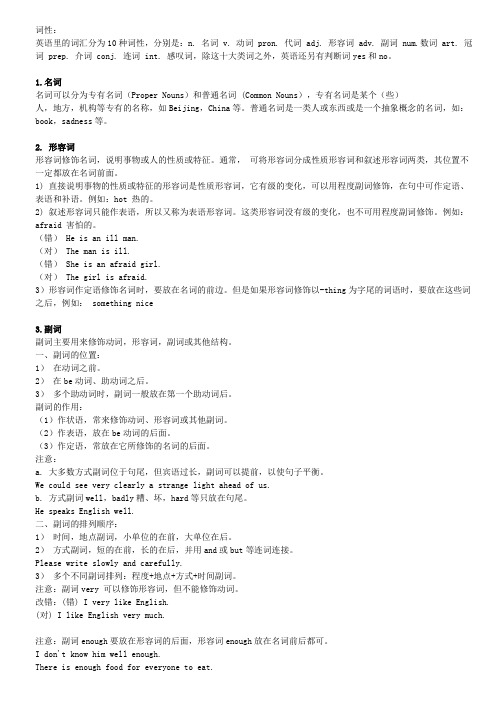
词性:英语里的词汇分为10种词性,分别是:n. 名词 v. 动词 pron. 代词 adj. 形容词 adv. 副词 num.数词 art. 冠词 prep. 介词 conj. 连词 int. 感叹词,除这十大类词之外,英语还另有判断词yes和no。
1.名词名词可以分为专有名词(Proper Nouns)和普通名词 (Common Nouns),专有名词是某个(些)人,地方,机构等专有的名称,如Beijing,China等。
普通名词是一类人或东西或是一个抽象概念的名词,如:book,sadness等。
2. 形容词形容词修饰名词,说明事物或人的性质或特征。
通常,可将形容词分成性质形容词和叙述形容词两类,其位置不一定都放在名词前面。
1) 直接说明事物的性质或特征的形容词是性质形容词,它有级的变化,可以用程度副词修饰,在句中可作定语、表语和补语。
例如:hot 热的。
2) 叙述形容词只能作表语,所以又称为表语形容词。
这类形容词没有级的变化,也不可用程度副词修饰。
例如:afraid 害怕的。
(错) He is an ill man.(对) The man is ill.(错) She is an afraid girl.(对) The girl is afraid.3)形容词作定语修饰名词时,要放在名词的前边。
但是如果形容词修饰以-thing为字尾的词语时,要放在这些词之后,例如: something nice3.副词副词主要用来修饰动词,形容词,副词或其他结构。
一、副词的位置:1)在动词之前。
2)在be动词、助动词之后。
3)多个助动词时,副词一般放在第一个助动词后。
副词的作用:(1)作状语,常来修饰动词、形容词或其他副词。
(2)作表语,放在be动词的后面。
(3)作定语,常放在它所修饰的名词的后面。
注意:a. 大多数方式副词位于句尾,但宾语过长,副词可以提前,以使句子平衡。
We could see very clearly a strange light ahead of us.b. 方式副词well,badly糟、坏,hard等只放在句尾。
(完整版)英语词性的分类及用法

英语词性的分类及用法一、词性的分类词类又叫词性,英语单词根据其在句子中的功用,可以分成十个大类。
1 名词noun n. student 学生2 代词pronoun pron. you 你3 形容词adjective adj. happy 高兴的4 副词adverb adv. quickly 迅速地5 动词verb v. cut 砍、割6 数词numeral num. three 三7 冠词article art. a 一个8 介词preposition prep. at 在...9 连词conjunction conj. and 和10 感叹词interjection interj. oh 哦前六类叫实词,后四类叫虚词。
二、名词名词概论名词复数的规则变化名词的格在英语中有些名词可以加"'s"来表示所有关系,带这种词尾的名词形式称为该名词的所有格,如:a teacher's book。
名词所有格的规则如下:1)单数名词词尾加"'s",复数名词词尾没有s,也要加"'s",如the boy's bag 男孩的书包,men's room 男厕所。
2)若名词已有复数词尾-s ,只加"'",如:the workers' struggle工人的斗争。
3)凡不能加"'s"的名词,都可以用"名词+of +名词"的结构来表示所有关系,如:the title of the song 歌的名字。
4)在表示店铺或教堂的名字或某人的家时,名词所有格的后面常常不出现它所修饰的名词,如:the barber's 理发店。
5)如果两个名词并列,并且分别有's,则表示"分别有";只有一个's,则表示'共有'。
(完整版)英语十大词性及其详细讲解

词类又叫词性,英语单词根据其在句子中的功用,可以分成十个大类1.名词 noun n. student 学生2.代词pronoun pron. you你3.形容词 adjective adj. happy甘14.副词 adverb adv. quickly迅速地5.动词 verb v. cut 砍、割6.数词 nu meral num. three三7.冠词article art. a 一个8.介词prepositi on prep. at 在... 9.连词conjunction conj. and和10.感叹词 interjection interj. oh 哦前六类叫实词,后四类叫虚词。
名词复数的规则变化 名词的格在英语中有些名词可以加“‘ s ”来表示所有关系,带这种词尾的名词形式称为该名 词的所有格,如:a teacher ' book 。
名词所有格的规则如下:1) 单数名词词尾加“ 's ",复数名词词尾没有 s ,也要加“'s ”,如the boy s'bag 男 孩的书包,men 'room 男厕所。
2) 若名词已有复数词尾-s ,只加“'",如:the workers ' struggle 工人的斗争。
大多数代词具有名词和形容词的功能。
英语中的代词,按其意义、特征及在句中的作用分为:人称代词、物主代词、 指示代词、反身代词、相互代词、疑问代词、关系代词、连接代词和不定代词 九种人称代词的用法:at least , I thought it was her. 我看到她和他们在一起, 至少我认为是I saw her with them她。
(her做宾语,them做介词宾语,her作主补)a. -- Who broke the vase ?--谁打碎了花瓶?b. -- Me.--我。
并列人称代词的排列顺序1) 单数人称代词并列作主语时,其顺序为:第二人称you第三人称he/she ;it第一人称I 如: You, he and I should return on time.2) 复数人称代词作主语时,其顺序为:第一人称we第二人称you第三人称they反身代词指示代词指示代词分单数(this / that )和复数(these / those )两种形式,既可作限定词又可做代词,疑问代词指人:who,whom ,whose指物:what既可指人又可指物:which冠词是位于名词或名词词组之前或之后,在句子里主要是对名词起限定作用的词。
(完整版)英语词性分类与用法
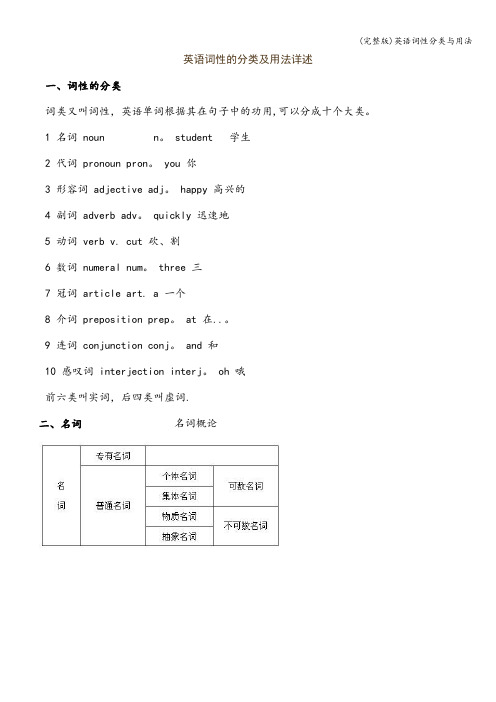
英语词性的分类及用法详述一、词性的分类词类又叫词性,英语单词根据其在句子中的功用,可以分成十个大类。
1 名词 noun n。
student 学生2 代词 pronoun pron。
you 你3 形容词 adjective adj。
happy 高兴的4 副词 adverb adv。
quickly 迅速地5 动词 verb v. cut 砍、割6 数词 numeral num。
three 三7 冠词 article art. a 一个8 介词 preposition prep。
at 在..。
9 连词 conjunction conj。
and 和10 感叹词 interjection interj。
oh 哦前六类叫实词,后四类叫虚词.二、名词名词概论名词复数的规则变化名词的格在英语中有些名词可以加“‘s"来表示所有关系,带这种词尾的名词形式称为该名词的所有格,如:a teacher’s book。
名词所有格的规则如下:1)单数名词词尾加“‘s",复数名词词尾没有s,也要加“'s”,如the boy‘s bag 男孩的书包,men’s room 男厕所.2)若名词已有复数词尾—s ,只加“‘”,如:the workers' struggle工人的斗争。
3) 凡不能加“‘s"的名词,都可以用“名词+of +名词”的结构来表示所有关系,如:the title of the song 歌的名字。
三、代词代词pronoun简称pron是代替名词的一种词类。
大多数代词具有名词和形容词的功能。
英语中的代词,按其意义、特征及在句中的作用分为:人称代词、物主代词、指示代词、反身代词、相互代词、疑问代词、关系代词、连接代词和不定代词九种人称代词的用法:I saw her with them, at least, I thought it was her.我看到她和他们在一起,至少我认为是她。
(完整版)英语十大词性及其详细讲解.docx

.一、词性的分类词类又叫词性,英语单词根据其在句子中的功用,可以分成十个大类。
1.名词 noun n. student学生2.代词 pronoun pron. you你3.形容词 adjective adj. happy高兴的4.副词 adverb adv. quickly迅速地5.动词 verb v. cut 砍、割6.数词 numeral num. three三7.冠词 article art. a 一个8.介词 preposition prep. at在 ...9.连词 conjunction conj. and和10. 感叹词 interjection interj. oh哦前六类叫实词,后四类叫虚词。
二、名词名词复数的规则变化名词的格在英语中有些名词可以加“‘ s”来表示所有关系,带这种词尾的名词形式称为该名词的所有格,如: a teacher ’s book 。
名词所有格的规则如下:1)单数名词词尾加“ 's”,复数名词词尾没有s,也要加“'s”,如the boy ‘s bag男孩的书包,men ’s room男厕所。
2)若名词已有复数词尾-s,只加“'”,如:the workers’struggle工人的斗争。
三、代词大多数代词具有名词和形容词的功能。
英语中的代词,按其意义、特征及在句中的作用分为:人称代词、物主代词、指示代词、反身代词、相互代词、疑问代词、关系代词、连接代词和不定代词九种人称代词的用法:I saw her with them,at least , I thought it was her.我看到她和他们在一起,至少我认为是她。
(her 做宾语, them 做介词宾语,her 作主补)a. -- Who broke the vase?--谁打碎了花瓶?b. -- Me.--我。
并列人称代词的排列顺序1)单数人称代词并列作主语时,其顺序为:第二人称 you第三人称he/she ;it第一人称I如: You, he and I should return on time.2)复数人称代词作主语时,其顺序为:第一人称 we第二人称you第三人称they反身代词指示代词指示代词分单数(this / that )和复数(these / those )两种形式,既可作限定词又可做代词,疑问代词指人: who ,whom ,whose指物:what既可指人又可指物:which四、冠词冠词是位于名词或名词词组之前或之后,在句子里主要是对名词起限定作用的词。
(完整word版)英语十大词性及其详细讲解
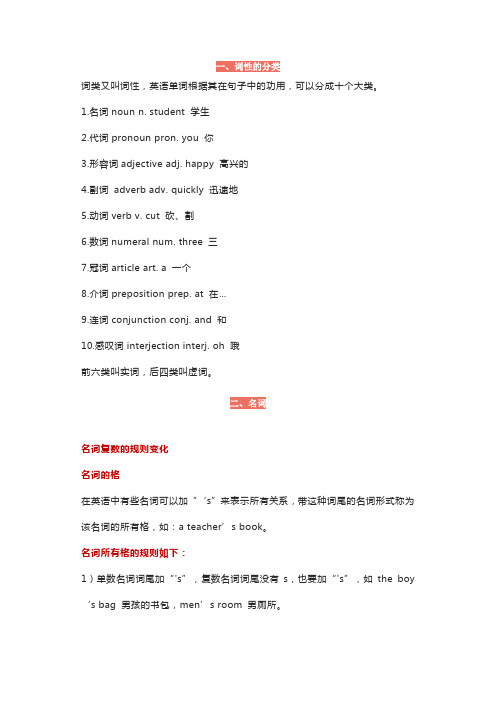
词类又叫词性,英语单词根据其在句子中的功用,可以分成十个大类。
1.名词noun n. student 学生2.代词pronoun pron. you 你3.形容词adjective adj. happy 高兴的4.副词adverb adv. quickly 迅速地5.动词verb v. cut 砍、割6.数词numeral num. three 三7.冠词article art. a 一个8.介词preposition prep. at 在...9.连词conjunction conj. and 和10.感叹词interjection interj. oh 哦前六类叫实词,后四类叫虚词。
名词复数的规则变化名词的格在英语中有些名词可以加“‘s”来表示所有关系,带这种词尾的名词形式称为该名词的所有格,如:a teacher’s book。
名词所有格的规则如下:1)单数名词词尾加“'s”,复数名词词尾没有s,也要加“'s”,如the boy ‘s bag 男孩的书包,men’s room 男厕所。
2)若名词已有复数词尾-s ,只加“'”,如:the workers’struggle工人的斗争。
大多数代词具有名词和形容词的功能。
英语中的代词,按其意义、特征及在句中的作用分为:人称代词、物主代词、指示代词、反身代词、相互代词、疑问代词、关系代词、连接代词和不定代词九种人称代词的用法:I saw her with them,at least,I thought it was her.我看到她和他们在一起,至少我认为是她。
(her做宾语,them做介词宾语,her作主补)a. -- Who broke the vase?--谁打碎了花瓶?b. -- Me.--我。
并列人称代词的排列顺序1) 单数人称代词并列作主语时,其顺序为:第二人称 you第三人称 he/she;it第一人称 I如:You, he and I should return on time.2) 复数人称代词作主语时,其顺序为:第一人称 we第二人称 you第三人称 they反身代词指示代词指示代词分单数(this / that)和复数(these / those)两种形式,既可作限定词又可做代词,疑问代词指人:who,whom,whose指物:what既可指人又可指物:which冠词是位于名词或名词词组之前或之后,在句子里主要是对名词起限定作用的词。
英语词性的分类及用法详述
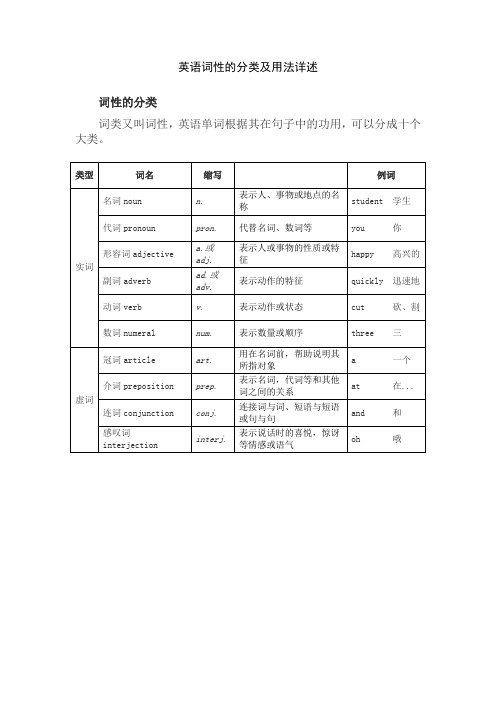
一、名词及其基本用法英语名词(Noun)可以从形式上进行分类,英语名词可以划分成专有名词和普通名词两大类。
从意义上划分,英语名词可分为个体名词、Nouns)。
物质名词、抽象名词和专有名词无法用数目来计算,称为不可数名词(Uncountable Nouns)。
集合名词有的可数,有的不可数。
(一)普通名词普通名词指一类人或事物的名称。
英语中普通名词分为可数名词和不可数名词。
可数名词一般有单、复数两种形式。
如a/one child,ten children。
而不可数名词一般只有一种形式。
如cash(现金)。
不可数名词之前不可直接用泛指限定词和数词。
不可数名词可与some一起用。
如:some money,some water。
也可与the一起用:the information(这信息)。
1、可数名词及其复数形式(1)可数名词的复数形式一般由词尾加-s或-es构成,其规则英语中有一部分名词由于历史或词源原因其复数形式的构成法是不规则的。
这种情况主要有:①元音字母变化。
例如:foot-feet man-men . woman-womentooth-teeth goose-geese mouse-mice②结尾为-en。
例如: child-children③单复数同形。
单复数同形的名词主要有:sheep, fish, Chinese, Japanese, deer等。
④只有复数形式。
例如:trousers, goods 等。
2、可数名词和不可数名词英语中的绝大多数名词既可以用作可数名词也可以用作不可数名词。
1.可数名词可数名词一般可以分成以下三类:第一类:如bike,desk, factory等,这类名词占可数名词的多数。
以bike为例:There are fifty bikes at this shop.这家商店有50辆自行车。
第二类:如clothes等,本身表示复数形式。
以clothes为例:She cares for nice clothes.她爱好穿着。
【英语的词性分类】必须牢记的英语十类词性分类及用法,史上最全讲解!
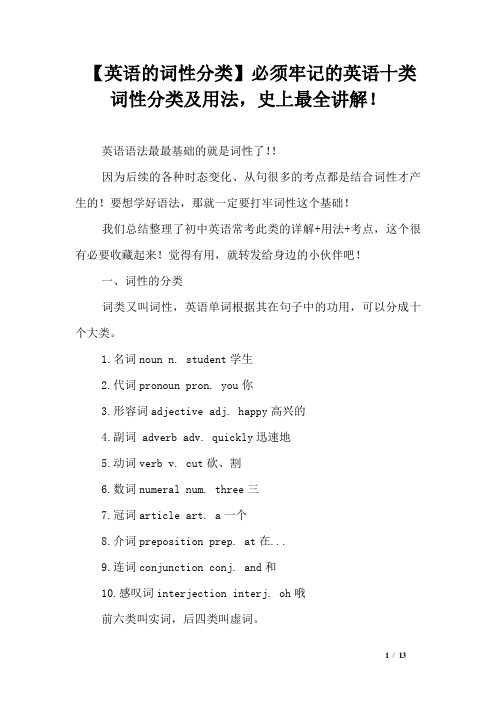
【英语的词性分类】必须牢记的英语十类词性分类及用法,史上最全讲解!英语语法最最基础的就是词性了!!因为后续的各种时态变化、从句很多的考点都是结合词性才产生的!要想学好语法,那就一定要打牢词性这个基础!我们总结整理了初中英语常考此类的详解+用法+考点,这个很有必要收藏起来!觉得有用,就转发给身边的小伙伴吧!一、词性的分类词类又叫词性,英语单词根据其在句子中的功用,可以分成十个大类。
1.名词noun n. student学生2.代词pronoun pron. you你3.形容词adjective adj. happy高兴的4.副词 adverb adv. quickly迅速地5.动词verb v. cut砍、割6.数词numeral num. three三7.冠词article art. a一个8.介词preposition prep. at在...9.连词conjunction conj. and和10.感叹词interjection interj. oh哦前六类叫实词,后四类叫虚词。
二、名词名词复数的规则变化名词的格在英语中有些名词可以加“‘s”来表示所有关系,带这种词尾的名词形式称为该名词的所有格,如:a teacher’s book。
名词所有格的规则如下:1)单数名词词尾加“'s”,复数名词词尾没有s,也要加“'s”,如the boy‘s bag男孩的书包,men’s room男厕所。
2)若名词已有复数词尾-s ,只加“'”,如:the workers’struggle工人的斗争。
三、代词大多数代词具有名词和形容词的功能。
英语中的代词,按其意义、特征及在句中的作用分为:人称代词、物主代词、指示代词、反身代词、相互代词、疑问代词、关系代词、连接代词和不定代词九种人称代词的用法:I saw her with them, at least, I thought it was her.我看到她和他们在一起,至少我认为是她。
英语十大词性及用法
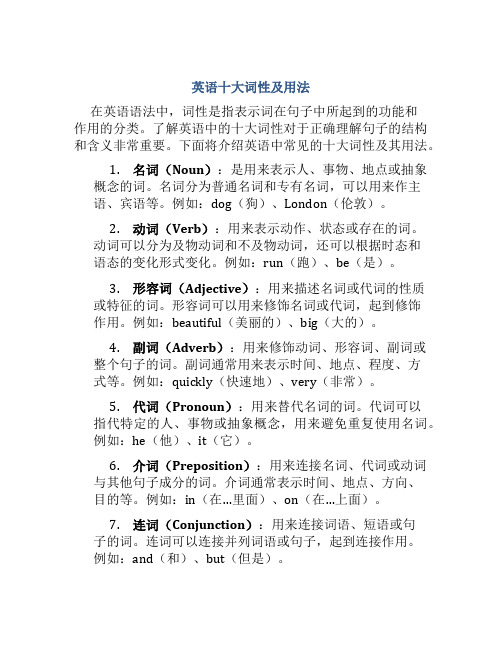
英语十大词性及用法在英语语法中,词性是指表示词在句子中所起到的功能和作用的分类。
了解英语中的十大词性对于正确理解句子的结构和含义非常重要。
下面将介绍英语中常见的十大词性及其用法。
1.名词(Noun):是用来表示人、事物、地点或抽象概念的词。
名词分为普通名词和专有名词,可以用来作主语、宾语等。
例如:dog(狗)、London(伦敦)。
2.动词(Verb):用来表示动作、状态或存在的词。
动词可以分为及物动词和不及物动词,还可以根据时态和语态的变化形式变化。
例如:run(跑)、be(是)。
3.形容词(Adjective):用来描述名词或代词的性质或特征的词。
形容词可以用来修饰名词或代词,起到修饰作用。
例如:beautiful(美丽的)、big(大的)。
4.副词(Adverb):用来修饰动词、形容词、副词或整个句子的词。
副词通常用来表示时间、地点、程度、方式等。
例如:quickly(快速地)、very(非常)。
5.代词(Pronoun):用来替代名词的词。
代词可以指代特定的人、事物或抽象概念,用来避免重复使用名词。
例如:he(他)、it(它)。
6.介词(Preposition):用来连接名词、代词或动词与其他句子成分的词。
介词通常表示时间、地点、方向、目的等。
例如:in(在…里面)、on(在…上面)。
7.连词(Conjunction):用来连接词语、短语或句子的词。
连词可以连接并列词语或句子,起到连接作用。
例如:and(和)、but(但是)。
8.冠词(Article):用来限定名词的词。
有定冠词“the”和不定冠词“a”、“an”。
冠词用来表示名词的特指和泛指。
例如:the book(那本书)、a cat(一只猫)。
9.数词(Numeral):用来表示数目、顺序或序数的词。
数词可以分为基数词和序数词,用来表示数量和顺序关系。
例如:three(三)、first(第一)。
10.感叹词(Interjection):用来表示情感、感叹或呼唤的词。
英语十类词性分类及用法-最全讲解
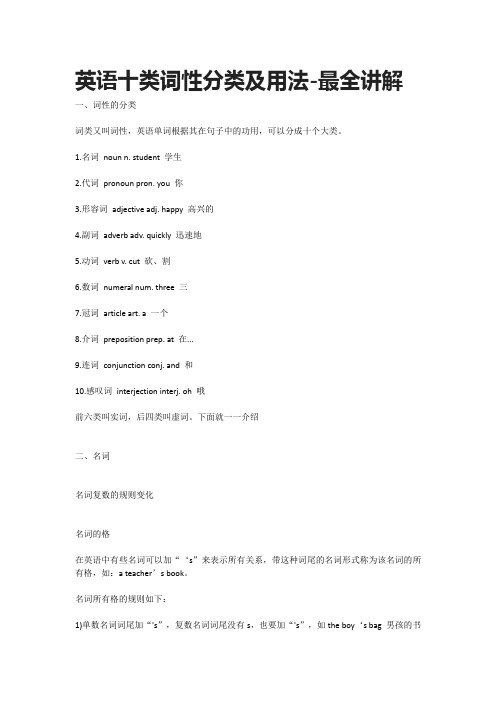
英语十类词性分类及用法-最全讲解一、词性的分类词类又叫词性,英语单词根据其在句子中的功用,可以分成十个大类。
1.名词noun n. student 学生2.代词pronoun pron. you 你3.形容词adjective adj. happy 高兴的4.副词adverb adv. quickly 迅速地5.动词verb v. cut 砍、割6.数词numeral num. three 三7.冠词article art. a 一个8.介词preposition prep. at 在...9.连词conjunction conj. and 和10.感叹词interjection interj. oh 哦前六类叫实词,后四类叫虚词。
下面就一一介绍二、名词名词复数的规则变化名词的格在英语中有些名词可以加“‘s”来表示所有关系,带这种词尾的名词形式称为该名词的所有格,如:a teacher’s book。
名词所有格的规则如下:1)单数名词词尾加“'s”,复数名词词尾没有s,也要加“'s”,如the boy‘s bag 男孩的书包,men’s room 男厕所。
2)若名词已有复数词尾-s ,只加“'”,如:the workers’struggle工人的斗争。
三、代词大多数代词具有名词和形容词的功能。
英语中的代词,按其意义、特征及在句中的作用分为:人称代词、物主代词、指示代词、反身代词、相互代词、疑问代词、关系代词、连接代词和不定代词九种人称代词的用法I saw her with them,at least, I thought it was her.我看到她和他们在一起,至少我认为是她。
(her做宾语,them做介词宾语,her作主补)a. -- Who broke the vase?--谁打碎了花瓶?b. -- Me.--我。
并列人称代词的排列顺序1) 单数人称代词并列作主语时,其顺序为:如:You, he and I should return on time.2) 复数人称代词作主语时,其顺序为:反身代词指示代词指示代词分单数(this / that)和复数(these / those)两种形式,既可作限定词又可做代词疑问代词指人:who,whom,whose指物:what既可指人又可指物:which四、冠词冠词是位于名词或名词词组之前或之后,在句子里主要是对名词起限定作用的词。
英语十大词性介绍
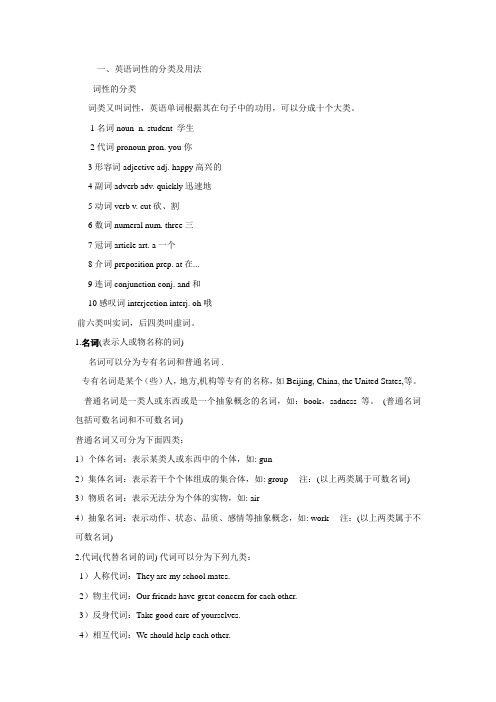
一、英语词性的分类及用法词性的分类词类又叫词性,英语单词根据其在句子中的功用,可以分成十个大类。
1 名词 noun n. student 学生2 代词 pronoun pron. you 你3 形容词 adjective adj. happy 高兴的4 副词 adverb adv. quickly 迅速地5 动词 verb v. cut 砍、割6 数词 numeral num. three 三7 冠词 article art. a 一个8 介词 preposition prep. at 在...9 连词 conjunction conj. and 和10 感叹词 interjection interj. oh 哦前六类叫实词,后四类叫虚词。
1.名词(表示人或物名称的词)名词可以分为专有名词和普通名词 .专有名词是某个(些)人,地方,机构等专有的名称,如Beijing, China, the United States,等。
普通名词是一类人或东西或是一个抽象概念的名词,如:book,sadness等。
(普通名词包括可数名词和不可数名词)普通名词又可分为下面四类:1)个体名词:表示某类人或东西中的个体,如: gun2)集体名词:表示若干个个体组成的集合体,如: group 注:(以上两类属于可数名词) 3)物质名词:表示无法分为个体的实物,如: air4)抽象名词:表示动作、状态、品质、感情等抽象概念,如: work 注:(以上两类属于不可数名词)2.代词(代替名词的词) 代词可以分为下列九类:1)人称代词:They are my school mates.2)物主代词:Our friends have great concern for each other.3)反身代词:Take good care of yourselves.4)相互代词:We should help each other.5)指示代词:Who are these people?6)疑问代词:What are you doing?7)关系代词:She married Tony Harper, who is a student too.8)连接代词:Do you know who did it?9)不定代词:Do you know anything about it?代词是非常活跃的词,特别是不定代词,比较复杂,我们要熟练掌握。
(完整版)英语十大词性及其详细讲解

词类又叫词性,英语单词根据其在句子中的功用,可以分成十个大类。
1.名词noun n. student 学生2.代词pronoun pron. you 你3.形容词adjective adj. happy 高兴的4.副词adverb adv. quickly 迅速地5.动词verb v. cut 砍、割6.数词numeral num. three 三7.冠词article art. a 一个8.介词preposition prep. at 在...9.连词conjunction conj. and 和10.感叹词interjection interj. oh 哦前六类叫实词,后四类叫虚词。
名词复数的规则变化名词的格在英语中有些名词可以加“‘s”来表示所有关系,带这种词尾的名词形式称为该名词的所有格,如:a teacher’s book。
名词所有格的规则如下:1)单数名词词尾加“'s”,复数名词词尾没有s,也要加“'s”,如the boy‘s bag 男孩的书包,men’s room 男厕所。
2)若名词已有复数词尾-s ,只加“'”,如:the workers’struggle工人的斗争。
大多数代词具有名词和形容词的功能。
英语中的代词,按其意义、特征及在句中的作用分为:人称代词、物主代词、指示代词、反身代词、相互代词、疑问代词、关系代词、连接代词和不定代词九种人称代词的用法:I saw her with them,at least,I thought it was her.我看到她和他们在一起,至少我认为是她。
(her做宾语,them做介词宾语,her作主补)a. -- Who broke the vase?--谁打碎了花瓶?b. -- Me.--我。
并列人称代词的排列顺序1) 单数人称代词并列作主语时,其顺序为:第二人称you第三人称he/she;it第一人称I如:You, he and I should return on time.2) 复数人称代词作主语时,其顺序为:第一人称we第二人称you第三人称they反身代词指示代词指示代词分单数(this / that)和复数(these / those)两种形式,既可作限定词又可做代词,疑问代词指人:who,whom,whose指物:what既可指人又可指物:which冠词是位于名词或名词词组之前或之后,在句子里主要是对名词起限定作用的词。
英语词性的分类及用法
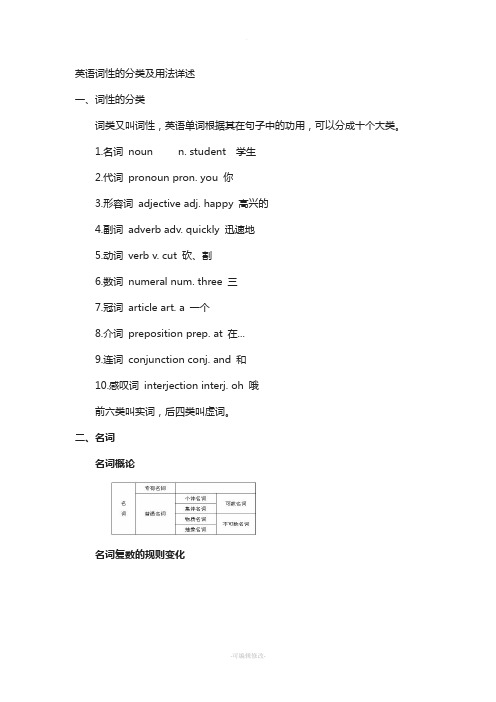
英语词性的分类及用法详述一、词性的分类词类又叫词性,英语单词根据其在句子中的功用,可以分成十个大类。
1.名词noun n. student 学生2.代词pronoun pron. you 你3.形容词adjective adj. happy 高兴的4.副词adverb adv. quickly 迅速地5.动词verb v. cut 砍、割6.数词numeral num. three 三7.冠词article art. a 一个8.介词preposition prep. at 在...9.连词conjunction conj. and 和10.感叹词interjection interj. oh 哦前六类叫实词,后四类叫虚词。
二、名词名词概论名词复数的规则变化名词的格在英语中有些名词可以加“‘s”来表示所有关系,带这种词尾的名词形式称为该名词的所有格,如:a teacher’s book。
名词所有格的规则如下:1)单数名词词尾加“'s”,复数名词词尾没有s,也要加“'s”,如the boy ‘s bag 男孩的书包,men’s room 男厕所。
2)若名词已有复数词尾-s ,只加“'”,如:the workers’struggle工人的斗争。
3)凡不能加“'s”的名词,都可以用“名词+of +名词”的结构来表示所有关系,如:the title of the song 歌的名字。
三、代词代词pronoun简称pron是代替名词的一种词类。
大多数代词具有名词和形容词的功能。
英语中的代词,按其意义、特征及在句中的作用分为:人称代词、物主代词、指示代词、反身代词、相互代词、疑问代词、关系代词、连接代词和不定代词九种人称代词的用法:I saw her with them,at least,I thought it was her.我看到她和他们在一起,至少我认为是她。
(her做宾语,them做介词宾语,her作主补)a. -- Who broke the vase?--谁打碎了花瓶?b. -- Me.--我。
英语词性词类详细讲解 ppt课件

英语词性词类详细讲解
1、规则变化
构成方法 一般在词尾加-er/ə/或-est/ist/
单音节 词和少 数多音 节词
以字母e结尾的形容词,加-r或-st
重读闭音节词只有一个辅音字母 时,应先双写辅音字母;再加-es 或-est
以“辅音字母+y”结尾的双音节 词,先改“+y”结尾的双音节词, 先改“y”为“i”,再加-er或-est
little
far
old
比较级
better worse more less farther further older elder
最高级
best worst most least farthest furthest oldest eldest
4. 副词(Adverb,adv)
副词是用来修饰动词、形容词、副词、 介词、连词等单词或短语,以说明 动作性质或状态的特征的词
用来表示人或事物的性质、状态和特征的词称为形容词 以-able, -al, -ful, -ish, -less, -ous, -y等后缀结尾的词 功能: 1.定语: The high price surprised him.
She told us something interesting.(后置定语) enough food, beautiful enough 2.表语: The sun was hot. 3.补语: They find the book quite interesting. 4.主语或宾语: The rich like living in the countryside. 5.状语: Wet or fine, he got up at six and took a walk in the park. (= Whether it was wet or fine, he got up at six and took a walk in the park.
英语单词词性分类是什么意思

英语里的词汇分为10种词性,分别是:n.名词 v.动词 pron.代词 adj.形容词adv.副词num.数词 art.冠词prep.介词conj.连词int.感叹词,除这十大类词之外,英语还另有判断词yes和no.分类实词:表示实在意义的词,有名词、动词、形容词、数词、量词、代词、副词.虚词:不表示实在意义而表示语法意义的词,有:介词、连词、助词、叹词.词性一、实词1.名词(nouns)n.:名词是词性的一种,也是实词的一种,是指代人、物、事、时、地、情感、概念等实体或抽象事物的词.名词可以独立成句.在短语或句子中通常可以用代词来替代.名词可以分为专有名词(Proper Nouns)和普通名词 (Common Nouns),专有名词是某个(些)人,地方,机构等专有的名称,如Beijing,China等.普通名词是一类人或东西或是一个抽象概念的名词,如:book,sadness等.2.代词(pronoun)pron.:代词是代替名词的一种词类.大多数代词具有名词和形容词的功能.英语中的代词,按其意义、特征及在句中的作用分为:人称代词、物主代词、指示代词、反身代词、相互代词、疑问代词、关系代词、连接代词和不定代词九种.3.数词(numeral)Num.:表示“多少”和“第几”的词,叫数词.其用法相当于名词或者形容词.数词分为基数词和序数词两种.4.形容词(adjective)adj.或a.;很多语言中均有的主要词类中的一种.主要用来修饰名词的词,表示事物的特征.形容词用来修饰名词或代词,表示人或事物的性质、状态,和特征的程度好坏,与否.5.副词(adverb)adv.:是一种用来修饰动词、形容词、全句的词,说明时间、地点、程度、方式等概念的词.副词是一种半虚半实的词.副词可分为:时间副词、地点副词、方式副词、程度副词、疑问副词、连接副词、关系副词、频率副词和说明性副词等.6.动词(Verb)v.:动词,就是用来形容或表示各类动作的词汇.基本上每个完整的句子都有一个动词,要表示第二个动作时可使用不定词、动名词、对等连接词、从属连接词或增加子句等方法连结.二、虚词7.冠词(article) art.:冠词是虚词,本身不能单独使用,也没有词义,它用在名词的前面,帮助指明名词的含义. 冠词可以说是名词的一种标志,它不能离开名词而独立存在.表示的主语数量或者特征.8.介词(preposition)prep.:介词是一种用来表示词与词、词与句之间的关系的虚词,在句中不能单独作句子成分.介词后面一般有名词、代词,或相当于名词的其他词类,短语或从句作它的宾语.介词和它的宾语构成介词词组,在句中作状语,表语,补语或介词宾语.介词可以分为时间介词、地点介词、方式介词、原因介词和其他介词.9.连词(conjunction)conj:连词是一种虚词,它不能独立担任句子成分而只起连接词与词,短语与短语以及句与句的作用.连词主要可分为4类:并列连词、转折连词、选择连词和因果连词.10.助词:助词是附着在词,短语,句子的前面或后面,表示结构关系或某些附加意义的虚词.助词有结构助词,时态助词,语气助词三种.11.叹词:(interjection)interj.:叹词是语法学术语.表示感叹、呼唤、应答的词.三、判断词现代汉语中表示条件、让步、转折等关系的连词多包含一个来自判断词“是”的语素,其他语言也有类似的情况.英语中的判断词有常见的“Yes”和“No”.四、其他1、动名词:动名词是一种兼有动词和名词特征的非限定动词.它可以支配宾语,也能被副词修饰.动名词有时态和语态的变化.2.、动词不定式:不定式定义:由to 动词原形构成.不定式是一种非限定性动词.而非限定动词是指那些在句中不能单独充当谓语的动词,可分为不定式,动名词,现在分词和过去分词3、分词:[participle]具有动词及形容词二者特征的词;尤指以-ing或-ed,-d,-t,-en或-n结尾的英语动词性形容词,具有形容词功能,同时又表现各种动词性特点,如时态,语态、带状语性修饰语的性能及带宾词的性能。
(完整版)英语词性的分类及用法

英语词性的分类及用法一、词性的分类词类又叫词性,英语单词根据其在句子中的功用,可以分成十个大类。
1 名词noun n. student 学生2 代词pronoun pron. you 你3 形容词adjective adj. happy 高兴的4 副词adverb adv. quickly 迅速地5 动词verb v. cut 砍、割6 数词numeral num. three 三7 冠词article art. a 一个8 介词preposition prep. at 在...9 连词conjunction conj. and 和10 感叹词interjection interj. oh 哦前六类叫实词,后四类叫虚词。
二、名词名词概论名词复数的规则变化名词的格在英语中有些名词可以加"'s"来表示所有关系,带这种词尾的名词形式称为该名词的所有格,如:a teacher's book。
名词所有格的规则如下:1)单数名词词尾加"'s",复数名词词尾没有s,也要加"'s",如the boy's bag 男孩的书包,men's room 男厕所。
2)若名词已有复数词尾-s ,只加"'",如:the workers' struggle工人的斗争。
3)凡不能加"'s"的名词,都可以用"名词+of +名词"的结构来表示所有关系,如:the title of the song 歌的名字。
4)在表示店铺或教堂的名字或某人的家时,名词所有格的后面常常不出现它所修饰的名词,如:the barber's 理发店。
5)如果两个名词并列,并且分别有's,则表示"分别有";只有一个's,则表示'共有'。
- 1、下载文档前请自行甄别文档内容的完整性,平台不提供额外的编辑、内容补充、找答案等附加服务。
- 2、"仅部分预览"的文档,不可在线预览部分如存在完整性等问题,可反馈申请退款(可完整预览的文档不适用该条件!)。
- 3、如文档侵犯您的权益,请联系客服反馈,我们会尽快为您处理(人工客服工作时间:9:00-18:30)。
The Times is published daily.
二. 用形容词表示类别和整体 某些形容词加上定冠词可以泛指一类人,与谓语动词的复数连接。如: the dead,the living,the rich,the poor,the blind,the hungry 三. 多个形容词修饰名词的顺序 限定词--数词--描绘词--(大小,长短,形状,新旧,颜色) --出处--材料性质, 类别--名词 a small round table;a tall gray building;a dirty old brown shirt;a famous German medical school
d. 与否定副词not合用,构成否定句,I don't like him.
e. 加强语气,He did know that.
2. 动词(verb)
(4)情态动词: 情态动词是一种本身有一定的词义,但要与动词原形一起 使用,给谓语动词增添情态色彩,表示说话人对有关行为或事物的态度 和看法,认为其可能、应该或必要等。
(3)助动词: 最常用的助动词有:be, have, do, shall, will, should, would
1) 助动词自身没有词义,不可单独使用
2) 助动词协助主要动词完成以下功用, a. 表示时态,He has got married. b. 表示语态,He was sent to England. c. 构成疑问句,Do you like college life?
英语词类讲解
第二课
10种英语词类
6 种英语实词(有实义):名词、动词、形容 词、副词、代词、数词 4种英语虚词:冠词、介词、连词和感叹词
6种英语实词
1.名词(noun,缩写式为n)
普通名词(common noun): 是某一类人、事物、某种物质或抽象概念的名 称。 luggage, success, traffic 专有名词 (proper noun):是特定的某人、地方或机构的名称。专有名词的 第一个字母必须大写。 Tom, China, A Tale of Two Cities, March, Saturday 可 数 性 : 可 数 名 词 ( countable nouns)& 不 可 数 名 词 ( uncountable nouns) ①冠词的使用 ②单复数 s/es ③谓语动词的搭配 *集合类名词:council ,government, group, jury, team, family
more
less farther/further
形容词的比较等级
二. 比较级的用法 1)比较级+than
2)比较级+and+比较级,more and more+原级
3)the+比较级,the+比较级 4)the+比较级 + of the two…
形容词的比较等级
三. 最高级 1. 形容词最高级的构成:
4. 部分双音节词和多音节词在前面加the most: athletic----the most athletic
5. 部分形容词不规则变化: good----best
形容词的比较等级
二. 最高级的用法 1)三者或三者以上比较,用the+最高级+名词+范围
This is the cleanest place of the city.
②可做情态动词又可做实义动词: need, dare ③具有情态动词特征: have (had, has) to, used to
3. 形容词(adjective,adj)
用来表示人或事物的性质、状态和特征的词称为形容词 以-able, -al, -ful, -ish, -less, -ous, -y等后缀结尾的词 功能:
4.主语或宾语: The rich like living in the countryside.
5.状语: Wet or fine, he got up at six and took a walk in the park. (= Whether it was wet or fine, he got up at six and took a walk in the park.
名词的功能:
1.主语:The bags are in the desk. 2.宾语:I washed my clothes yesterday. 3.表语:This is a good book. 4.宾语补足语: We selected him our monitor. 5.介词宾语: Mary lives with her parents.
must, can (could), may (might), shall (should), will (would), need, dare, have (had, has) to, used to
①只做情态动词:
must, can (could), may (might), shall (should), will (would)
4. 副词(Adverb,adv)
副词是用来修饰动词、形容词、副词、 介词、连词等单词或短语,以说明 动作性质或状态的特征的词 (1)一般副词主要分为以下几种: ①时间副词, 如: today, now, tomorrow, for 3 minutes ②地点副词, 如: here, there, above, outside ③方式副词, 如: hard, well, badly, fast, slowly ④程度副词, 如: very, quite, much, still, almost ⑤频率副词, 如: often, always, sometimes, never (2) 疑问副词(放在特殊疑问句的句首), 如: how, when, where, why (3) 关系副词(放在定语从句句首), 如: when, where, why (4)连接副词(放在名词从句句首), 如: how, when, where, why, whether
3. 形容词(adjective)
用来表示人或事物的性质、状态和特征的词称为形容词
以-able, -al, -ful, -ish, -less, -ous, -y等后缀结尾的词
-ed 人的感受: tired, tiring; amazed, amazing; fascinated, fascinating;
一般在词尾加-er/ə/或-est/ist/
以字母e结尾的形容词,加-r或-st 重读闭音节词只有一个辅音字母 时,应先双写辅音字母;再加-es 或-est 以“辅音字母+y”结尾的双音节 词,先改“+y”结尾的双音节词, 先改“y”为“i”,再加-er或-est 多音节 词和部 分双音 节词
单音节 词和少 数多音 节词
1.定语: The high price surprised him.
She told us something interesting.(后置定语) enough food, beautiful enough 2.表语: The sun was hot. 3.补语: They find the book quite interesting.
4. 部分双音节词和多音节词在前面加more: athletic----more athletic
5. 部分形容词不规则变化: good----better
形容词不规则变化:
原级 good well bad badly ill many much little far 比较级
better worse
6.定语:She is a Party member.
women doctors meeting rooms
2. 动词(verb)
分类:实义动词(行为动词),连系动词,助动词,情态动词 基本形式:原形、第三人称单数形式、过去式、过去分词和现在分词
(1)实义动词:
及物动词( transitive verb ): He's reading a magazine. 他正在读一本杂志。(单宾语) Mr Zhang teaches us English. 张老师教我们英语。(双宾语:us是间接宾语, English是直接宾语) 不及物动词( intransitive verb ): The sun rises. He works hard.
2)表示“最…之一”,用“on of the +形容词最高级+名词复数” This is one of the most interesting books that I’ve ever read.
一、形容词和副词比较级和最高级的构成
1、规则变化
构成方法 原 级 cold fast nice large big hot easy early tired 在词前加more或most easily more easily most easily 比较级 colder faster nicer larger bigger hotter easier earlier more tired 最高级 coldest fastest nicest largest biggest hottest easiest earliest most tired
2. 动词(verb)
(2)连系动词: be动词(is, am, are, was, were, have/has been)
感官系动词(feel,smell,taste,look,sound):后面一般加形容词
变化系动词(become, get, grow, turn) :后面一般加形容词
2. 动词(verb)
1)单音节形容词后加-est,以不发音的e结尾加-st:
2)short----shortest nice----nicest 2. 辅音字母+y结尾的双音节词,改y为i加-est:
